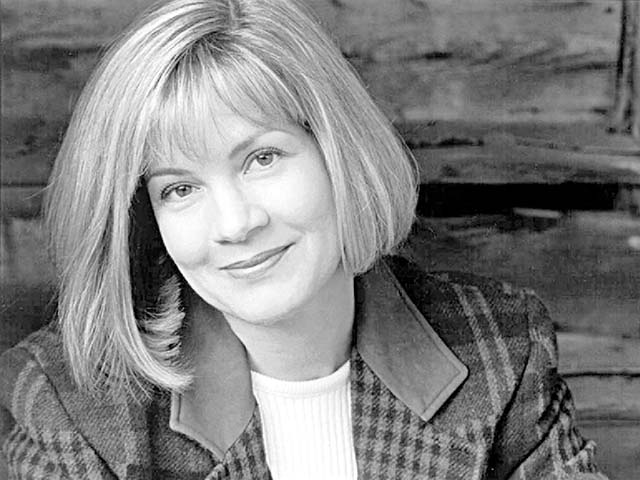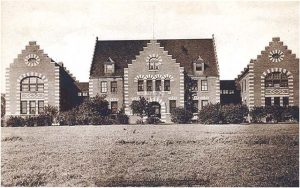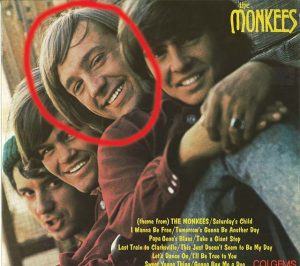When Nancy Ringham (St. Olaf Class of 1977) and Sylvia Rhyne (Carleton Class of 1978) performed together in St. Paul’s Chimera Theater musical, “How to Succeed in Business Without Really Trying,” in the summer of 1978, no one could have predicted that, within three years, Nancy would find herself thrust onto a Broadway stage in “My Fair Lady” in the role of Eliza Doolittle opposite Rex Harrison and within four years Sylvia would be plucked from the chorus to sing a solo part in the New York City Opera production of “The Marriage of Figaro.” And these experiences were just the start of their illustrious careers.
 Born in Moorhead, Minnesota, Nancy Ringham spent most of her youth in Edina. Speaking from her home in Tenafly, New Jersey, Nancy told me, “I was a bandie, not a singer,” playing the flute in school. But when she came to St. Olaf in 1973, she sang with the Manitou Singers, Repertory Singers and Chapel Choir and added a theater major to her music major after appearing in a “life-changing” 1974 production of “Godspell.” Directed by Patrick Quade, “Godspell” won an American College Theater Festival Award as one of the top ten productions in the country and toured for three weeks. Nancy also played the lead in “Medea” and had a role in “The Maids.” She spent half her junior year studying in Oxford, England, where she performed in the Oxford playhouse.
Born in Moorhead, Minnesota, Nancy Ringham spent most of her youth in Edina. Speaking from her home in Tenafly, New Jersey, Nancy told me, “I was a bandie, not a singer,” playing the flute in school. But when she came to St. Olaf in 1973, she sang with the Manitou Singers, Repertory Singers and Chapel Choir and added a theater major to her music major after appearing in a “life-changing” 1974 production of “Godspell.” Directed by Patrick Quade, “Godspell” won an American College Theater Festival Award as one of the top ten productions in the country and toured for three weeks. Nancy also played the lead in “Medea” and had a role in “The Maids.” She spent half her junior year studying in Oxford, England, where she performed in the Oxford playhouse.
After graduating in 1977, Nancy took a job as a hostess in a Bloomington hotel while auditioning for community theater parts and studying dance. She made her professional debut as a chorus member at the Chanhassen Dinner Theater, had her first major role at the Chimera Theater in 1978 and a small part in the Guthrie Theater production of “The Beggar’s Opera” in 1979.
Nancy headed to New York City in the fall of 1979, planning to “take a few classes, audition and move back to Minneapolis.” In the spring of 1980, Nancy was one of around 600 actors who took time off from waiting tables to audition for a pre-Broadway 25th anniversary national tour of “My Fair Lady,” starring Rex Harrison, who had originated the role of Henry Higgins and had won both a Tony and an Oscar for it. The music director remembered Nancy from an earlier audition and she was chosen to be a member of the chorus.
The role of Eliza, the Cockney flower seller who is transformed by Professor Higgins into the toast of high society, was being played by British actress Cheryl Kennedy (at the insistence of Harrison) on the national tour. In March of 1981, in Chicago, Nancy became the understudy for this role and at the last stop before Broadway in Boston, Nancy played Eliza in matinees to save the stress on the star’s voice. Then, just days before the Broadway opening, the cast was told that Cheryl had nodes on her vocal cords and Nancy would be taking her place for the run of the show.
“I started to cry,” said Nancy, who was still working on a proper (improper) Cockney accent and had only a couple more previews to prepare for this role of a lifetime. It was an exhausting, “exciting, intimidating and terrifying” time for Nancy. Most critics came to the final preview, which had not gone very well.
On opening night, Nancy was thinking, “This is sort of the beginning and end of my Broadway career.” She gained strength upon seeing all the flowers and telegrams from “all those people who believed in me.” Fifteen minutes before the play began, Nancy was given a note from Harrison which said simply, “Break a leg. Let the first two scenes rip.” Harrison had not been very supportive up to this point, and Nancy was relieved when “opening night went beautifully” and the 12-week run was extended to 16 (see below).
After this phenomenal start, Nancy decided to step back to get a “firm foundation of experience” for her career and today has an extensive list of Off-Broadway and regional theater credits. She has been guest soloist with the Florida Philharmonic and with Peter Nero and the Philadelphia Pops and has sung at Carnegie Hall with Bernadette Peters. On television, besides doing more than 30 commercials, she has had guest roles on daytime dramas, appeared on the Chappelle Show and played David Letterman’s wife in several sketches on his show.
In 1987, Nancy toured as Sally Bowles in “Cabaret” with Joel Grey in his Oscar- and Tony-winning role as the emcee, receiving a rave review from the Star Tribune when the tour hit Minneapolis. Two of her favorite Broadway roles were starring opposite Sting in the 1989-90 revival of “The Threepenny Opera,” and opposite Mac Davis in 1992 in “The Will Rogers Follies” and later opposite Larry Gatlin and Mickey Rooney. Her last Broadway role was in the Roundabout Theatre Company’s 2001 revival of “Follies.”
Nancy and Minneapolis native Deborah Sonnenberg produced and starred off-Broadway in Kathleen Clark’s “Secrets of a Soccer Mom” for three months last spring. Playing a suburban “soccer mom” resonated with Nancy because she and her husband, Christopher Smith (a production supervisor for Broadway shows), have two daughters, Caitlyn (9) and Madeline (7). Nancy and Deborah (whose “A-Frame Production Company” is named in honor of Lake John, where both had spent summers) asked themselves, “If we went out to a show, what would we want?” and came up with some novel ideas, including 11 a.m. matinees to accommodate suburban mom schedules, champagne, massage chairs, a gift shop and discounts for nearby restaurants. Said the New York Post: “Welcome to ‘Secrets of a Soccer Mom,’ which has the only lobby in town that could double as a day spa.” A national tour was in the works for 2009-2010 and, said Nancy, “I would love to come to Minneapolis.”
Nancy still has ties to Minnesota, with a family house at Lake Sylvia shared by her siblings and their children, including a niece Amy who is a St. Olaf graduate. Also, Nancy’s daughter, Caitlyn, has proclaimed that she wants to be an Ole someday.
Sylvia Rhyne
 Sylvia Rhyne does not remember a time when music was not paramount in her life. She traces it back to having her crib placed “directly over the loudspeaker for my parents’ stereo system,” with her mother ramping up the sound while vacuuming.
Sylvia Rhyne does not remember a time when music was not paramount in her life. She traces it back to having her crib placed “directly over the loudspeaker for my parents’ stereo system,” with her mother ramping up the sound while vacuuming.
Sylvia’s father, Charles S. Rhyne, an art history professor at Reed College in Oregon, took his family to England to pursue studies of the early paintings of John Constable. So Sylvia was in school in London at the ages of 6-7 and 9-10, providing the opportunity for “regular visits to operas and ballets” and travel exposure to “landscapes full of castles and cathedrals,” which “made a huge difference in my life.”
Sylvia felt a “little out of step with my friends on both sides of the ocean” and it was not until she came to Carleton in 1974 that “I came into my own and blossomed.” Sylvia was attracted to “Carleton’s sense of freedom and self-expression and, most of all, to the wonderful feeling of acceptance” where eccentricities were valued and students had a chance to “explore what makes them unique.”
During the spring of her freshman year, Sylvia was cast by William Wells as Yum Yum in “The Mikado,” her first leading role in a musical. Steve Kelly directed Sylvia as Mary Magdalene in a medieval Easter drama, sung in Latin chant, and she was greatly influenced by a class Kelly taught with Phil Niles called “Medieval Monasteries.”
Sylvia’s “absolute favorite” student collaboration was with Cathy Costen in “Amahl and the Night Visitors,” where Sylvia played the mother. Sylvia and her roommate Katryn Conlin set poetry to music for “The Mandrake,” creating “our own particular style of folk/medieval music with our two voices and guitar.” They also wrote original music for weekly Mass in Carleton’s chapel.
After graduation in 1978, Sylvia thought of applying to library school, but she “jumped right in” to musical theater instead and “I’ve never been sorry!” All it took was that first show at the Chimera Theater to convince her this was her life’s calling.
So off to New York City she went and within a few years she was singing with the New York City Opera, 32 operas in all during her career there. A highlight of this time was performing in Leonard Bernstein’s “Candide,” directed by Hal Prince, where she found herself singing the finale “under the baton of Leonard Bernstein himself.”
Sylvia went on to “play roles that I had dreamed of ever since childhood.” Among her many credits are playing the Mother Abbess in “The Sound of Music” and Johanna in Stephen Sondheim’s “Sweeney Todd” on Broadway and Anne in the national tour of “La Cage Aux Folles.” She was in “Follies” with Juliet Prowse and had the “novel experience” of being the only American cast in the Viennese production of “A Chorus Line.” Her longest-held role was in “Phantom of the Opera” (see below).
Among her performances are singing for the prime minister of Singapore in 1996 and at a benefit conceived by Katie Couric in New York City in 2002, along with Chita Rivera, Rita Moreno, Bette Midler and others. She also had a role on “All My Children.”
Sylvia has been on tour this summer as part of a duo called Asteria. In 2000, Sylvia had joined the Renaissance Street Singers of N.Y.C., a group which reminded her of the “sense of individuality” she had felt at Carleton. Soon she was meeting weekly in Central Park with one of the members, Eric Redlinger, to sing medieval love songs with him from the courts of Burgundy which he had found at the Hague during studies in Switzerland.
“We really clicked,” said Sylvia. It was a beautiful blend for them, both professionally and personally. Sylvia described the melodies as “heartbreakingly beautiful” with “deeply moving texts” which she approached as an actress might, a different style from most other interpreters. They submitted a recording of their work to a competition for medieval and Renaissance music sponsored by Early Music America and in a live concert on Oct. 6, 2004, in New York City, Asteria (with Sylvia’s lilting soprano and Eric’s tenor and lute playing) won first prize with a performance described as “deeply communicative…meltingly beautiful” by the New York Times. Their reward was $5,000 and an appearance at the Boston Early Music Festival in June 2005, which led to more concerts and another successful recording.
In 2006-07, Sylvia and Eric spent a year in France to experience the source of their music first-hand, learning about the writers of the “rich texts and exquisite music” and how the music sounded when it was performed within the palaces for which it was written, and studying ancient manuscripts where they found “melodies and poems that no one has heard in 500 years.” Last May they returned to perform in France and Germany. A highlight of both trips has been a stay at the Chateau de Germolles, the last remaining country palace of the Dukes of Burgandy, owned by museum curators who have invited them back for yearly residencies. The website www.asteriamusica.com documents Asteria’s travels in Europe and includes a blog, photos, podcasts, music videos and information about their recordings.
After their return to New York, Eric will resume work as a research fellow at NYU-Brooklyn Polytechnic and Sylvia will continue teaching private classes in musical theater audition and performance technique. She also will be pursuing her artistry as a doll-maker. Her handcrafted dolls, which have been commissioned by actors who want to commemorate a favorite role, can be ordered by the public. She has been working for two years on a line of fairy dolls, which may be manufactured by a major retailer in a year or so.
And will she be returning to the stage? Could be.
“I believe in having it all,” she said brightly.
Thirty years after appearing together on a stage in St. Paul, it appears that Sylvia Rhyne and Nancy Ringham do have it all.
Thanks to Nancy and Sylvia for their willing cooperation and to Eric Hillemann of the Carleton Archives and Jeff Sauve of the St. Olaf Archives for their research assistance.
A Cinderella Story in a Cinderella Story
The New York Times review of “My Fair Lady” from Aug. 19, 1981, said that “considerable drama was added to the reopening by the last-minute assumption of the title role by the understudy, Nancy Ringham…Miss Ringham, a young American actress, was rushed in to make her Broadway debut, turning the evening into a Cinderella story within a Cinderella story. She is an appealing leading lady with a strong voice.” The reviewer noted that her accent wavered, but “One imagines that she will improve as she continues to play this challenging role.” Nancy’s family had attended the opening and friends from Northfield drove out for another performance. Myrna Johnson, Ruth Legvold and Nancy Haugen had a surprise in store after they took their seats in the audience. Ron Sell, St. Olaf Class of 1966, was playing principal horn in the orchestra and warmed up by playing a complete version of St. Olaf’s “Um Yah Yah” song, in honor of their presence in the theater.
Sylvia and Phantom of the Opera
One role in particular “had always called to me,” said Sylvia. It was Christine in “The Phantom of the Opera.” Sylvia has the unique distinction of being the only actress who has played this role in all three of the major musical versions. Hal Prince hired and directed her in Andrew Lloyd Webber’s version.
“This was truly my dream come true…There is nothing like being surrounded by drifting mist and candles, with an orchestra playing their hearts out while you and your fellow actors express every height and depth of human emotion. I was in heaven every night. I got to perform the role all over the world, and it is one of the most precious periods of my life,” Sylvia said.
When Sylvia gave a Laudie Porter convocation speech at Carleton, she spoke about her experience of “following my dream and about how to discover your own.” Sylvia was delighted when a student saw her walking on campus the next day, grabbed her hand and told her, “I was so inspired by your talk yesterday and now I know that I want to be the ambassador to Argentina!” Sylvia concluded: “I can’t wait to see if she does it.”







